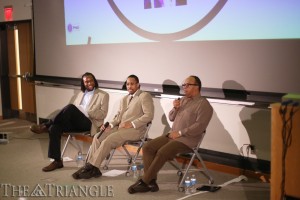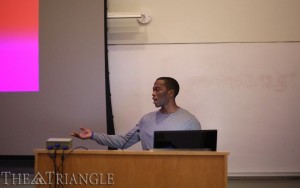On Feb 26, the one-year anniversary of Trayvon Martin’s death, panelists, students and community members gathered in the Papadakis Integrated Sciences Building’s auditorium to discuss stand-your-ground laws.
Discussion topics included how the law has been implemented, how similar cases have been dealt with unjustly toward black people, and potential solutions for how the racist mindset can be dissolved from our society.
Martin was a black 17-year-old shot and killed in Sanford, Fla. The shooter, George Zimmerman, was not arrested and alleged that he shot Martin in self-defense. Many believed that the Sanford Police investigation included questionable police conduct, and Martin’s family believed his slaying was a hate crime. Protests in New York, Philadelphia and Florida, along with celebrity attention given to the case, brought the issue to the U.S. Justice Department.
Tuesday’s event brought about a wide scale conversation and platform for discussion relating to the injustices that the black community faces on a daily basis.
Shesheena Bray, activist and counselor at the Upward Bound program of the University of Pennsylvania, moderated the event and gave the audience a brief background of stand-your-ground laws and presented examples of other victims of race-related violence and injustices. The law protects an individual who commits an act of self-defense under the circumstance that unlawful threats are present with the potential to cause great bodily harm or death. In order for the defense to be accepted in legal contexts, there must also be present an inability to retreat or otherwise avoid the conflict. The trouble is, as Bray explained, “It is difficult to prove. … African Americans are not always protected equally.”
Zimmerman is being charged with second-degree murder. Since the killing a year ago, Zimmerman has gained 105 pounds, which, according to Bray, is evidence of a guilty conscience.
A graph showed the interest of the public in the Martin case — the media attention it received was extremely high for a few months, but by June 2012 public interest had dwindled to being barely existent.
Anthony Monteiro, associate director of the Institute for the Study of Race and Social Thought at Temple University, pointed to the need to separate the general usage of stand-your-ground laws from being used for racist violence.
“This is an example of extrajudicial murder,” Monteiro said. “It’s when people start taking the law in their own hands.”
Still, some believe that reasons for some extrajudicial killings of innocent people may lie in one four-letter-word: fear. “‘Fear first, understand later’ is what American society teaches,” Raceme Miller Sr., author, teacher and director of Manifesting Opportunities for Renewal and Empowerment, said.
That society teaches people to have a fear of young African-American males and to rush to judgments about it is happening too often, Miller said. “And we’re creating justifications for doing so.”
However, these justifications only point to more deeply rooted issues, such as “white supremacy and the devaluing of black and brown bodies,” Gabriel Bryant, the radio host of G-Town Radio and director of Young Men’s Initiative, said. “We must look at the news and see how it connects to all of our people.”
According to Bryant, 72 percent of all stop-and-frisk subjects in Philadelphia are African-American males, although only 8 percent of all the frisks end in arrest. As far as Monteiro is concerned, Zimmerman should undoubtedly be convicted during his June 10 hearing on the Martin case.
“Zimmerman is a domestic terrorist, but he’s not labeled as such because he killed a black man. He’s seen as protecting the homeland,” Monteiro said. Multiple comments made by the panelists touched on the presence of the crypto-fascist police state that runs our country. “You think we’re a democracy?” Monteiro asked. “Purge that thought from your mind. We live in a military empire.”
When it concerns solutions to the ongoing race dilemma, the panelists acknowledged that it is a long-term process and will not happen overnight. Oppressed people fight not to change a law but to change a system. “Any great movement requires great clarification on the issue,” Monteiro said.
Christopher Bonnaig, a sophomore sociology major and event coordinator of the Biddle Law Society, extended his appreciation to each of the panelists and audience members who attended the event. “With knowledge [about these issues] comes responsibility. … This is an issue of class,” he said.
Another colored, nonblack woman from the audience proudly proclaimed, “I stand in solidarity with this cause.”
Another gentleman provoked the audience when he said, “We’re fighting a technical, social and economic war.” However, he brought to light one word that had not been said throughout the whole presentation: “L-O-V-E. Why aren’t we bringing up love?”
“In [Martin’s] name we must recommit ourselves to the most tenacious struggle,” Monteiro concluded.
The Stand Your Ground presentation was co-sponsored by the College of Arts and Sciences, Africana Studies, the Biddle Law Society and the Drexel Black Graduate Student Union.



